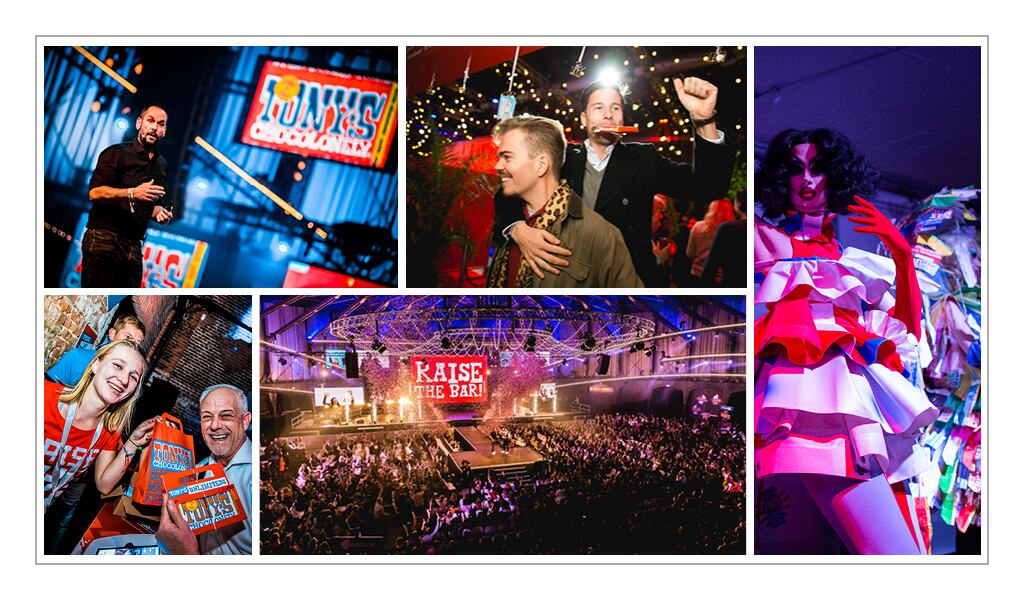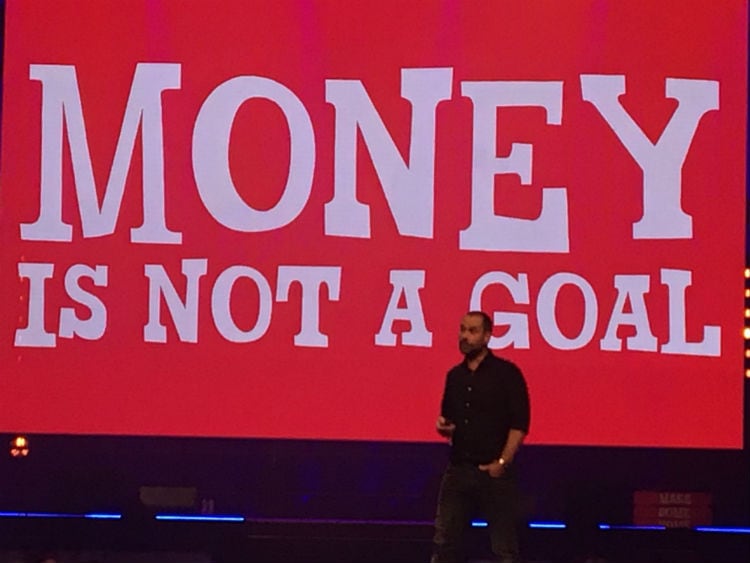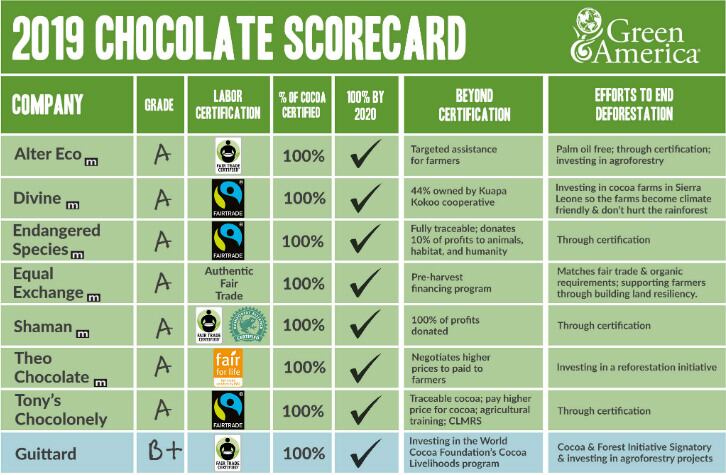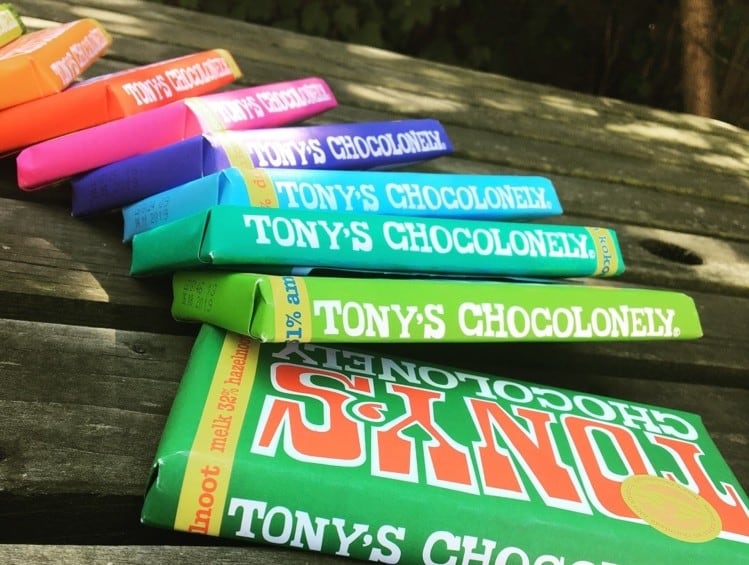We meet at Tony’s Chocolonely flagship store and office in the trendy Westergasfabriek district of Amsterdam where, later in the day, the ethical Dutch chocolate firm will host its annual fair and release its financial report in the former gasworks venue to a packed and enthusiastic audience of devotees of the brand.
Schoenmakers starts by saying how very proud he is of the report, as “once again, it integrates Tony’s Chocolonely’s roadmaps on sustainability.”
Even though the brand ‘failed’ to make a profit, Schoenmakers said he was comfortable with the financial figures in what has been a transformation year for the company.
He has been with Tony’s for just over two years after working with the Dutch government as a senior policy officer for sustainable trade and development, and as an advisor for the Social and Economic Council.
As soon as our meeting was over, he was off to the Dutch parliament to advise members on sustainability in the cocoa industry, before returning later in the evening to Chocolonely HQ for the party.
I want to emphasise that some form of legislation is absolutely necessary
“Our mission is to change the whole of the chocolate industry and we want to do that by leading by example, to show how it can be done, but also by inspiring others to act,” he says.
“We look at it through five key players that are crucial - cocoa farmers, chocolate brands, consumers, retailers and governments - in the producing countries, and in this case, governments in consuming countries, and we are pushing for them to influence and to implement legislation that demands for companies to follow UN principles. They call it ‘Human Rights diligence’, we look at it as taking responsibility for the supply chain.”
At the World Cocoa Foundation Partnership Meeting in Berlin last month, Heidi Hautala, vice president of the European Parliament warned that legislation was imminent within the EU on all imported cocoa.
It’s a move that Schoemakers says he would welcome and is one of the reasons for his visit to the Dutch parliament.
“I want to emphasise that some form of legislation is absolutely necessary, the cocoa sector is known, and sometime famous for, strong commitments and sustainability efforts but the fact of the matter is that after almost two decades of commitment and piloting programmes, we don't see real results.
“And that's because companies are still not taking full responsibility for their supply chain … so they have some sustainability programmes and some cooperatives that they work with, but it's only covering a fraction of their supply chain.
Schoenmakers thinks it’s a poor show that Tony’s is the only chocolate company with a fully traceable supply chain and knows exactly where its cocoa comes from.
Raise the bar
“So you can say, with legislation, you raise the bar for at least a minimum level of responsibility a company should take, meaning investigating what your supply chain looks like, where are the risks or violations of human rights, and then act upon it.”
Transparency is key for Tony’s Chocolonely since it was founded in 2007 by two Dutch journalists who were appalled with conditions for cocoa farmers in West Africa. From the outset, its mission was to make ‘slave-free chocolate the norm’ in the industry.
Almost 20 years on and Schoenmakers says there is still a long way to go, and even in his own company’s heavily monitored supply chain, there are still cases cropping up of child labour on farms where it sources its cocoa.
While proud of the results from Tony’s Child Labour Monitoring and Remidation System over the past year, he is less proud that the programme uncovered 259 additional cases of child labour.
“But I am proud of the fact that we found them – we worked together with the cooperatives and they used the system as a measuring tool to tackle it. When you find a case, you can work with the family or a teacher to remediate. It’s a lot of work, it takes time and it takes at least six months to see if the child in question is out of child labour,” he says.
He says 56 cases have been confirmed as remediated and another 315 are in the process of remediation.
“It's useless to have one brand that can claim ‘look we’re slave free’ and the rest of the sector is still not. So that's why our mission is not only to make Tony’s Chocolonely slave free, but the whole sector slave free - and we are serious about our own value chain, of course. But there is no guarantee there will not be cases in the future because we have grown so quickly; every year new farmers supply to us and often these cases are often very hidden – but we don’t want to hide them, we want to find them and remediate them.”
Fairtrade certification
Shoenmakers says the company works with Fairtrade certification as a first step, but says it’s not the solution to the problem.
“That’s because it is farmer certification, but farmers are not the problem so they cannot be the solution … much more is needed. On top of the Fairtrade Premium for example, we pay an additional price and we work together with Fairtrade on strengthening cooperatives, but we do a lot more.”
Schoenmakers says that, along with most of the other major chocolate companies, Tony’s supports the Living Income Differential recently introduced by Côte d'Ivoire and Ghana.
He says Tony’s and Fairtrade have aligned on a living income reference price that farmers should receive at least $2.20 per kg of cocoa at farmgate in Côte d'Ivoire (the price is currently $1.37) and $2.10 in Ghana ($1.52 currently).
Barry Callebaut produces all its chocolate (couverture) and Schoenmakers says Tony’s works with two other Belgian co-manufactures that mould liquid chocolate into its bars.
To ensure its chocolate doesn’t get mixed up with other supply chains, Tony’s has its own production line set up in Barry Callebaut’s giant cocoa factory in Wieze, Belgium.
I ask him how important the relationship with Barry Callebaut, one of the largest cocoa suppliers in the world, for Tony’s Chocolonely, given the company’s scale supplying literally tonnes of cocoa to thousands of other companies.
“We have two feelings about them,” he says. “One is that they are part of the big chocolate industry and one of the biggest processes of cocoa absolutely in the world and therefore have tremendous control, but we want them to do more.
“On the other hand, they have been a valuable partner for us, helping us change our supply chain in a way that can be an example for the whole industry."
'Beantracker'
Schoenmakers says the company has been developing its own cloud-based ‘Beantracker’ platform, where all partners, including Barry Callebaut and the cooperatives in the chain, have access to the platform and can log the incoming and outgoing shipments of cocoa.
As he looks back on achievements of the past year, which include a successful launch of the brand in the UK, Schoenmakers says he is already looking forward to the next 12 months.
There are plans to launch in Germany and work with more cooperatives in Africa, and he says the business will continue to grow as the brand becomes more popular with consumers willing to pay more for its chocolate bars that does what they say on their colourful and unique wrappers.




